MBA商务英语学习
- 格式:ppt
- 大小:469.50 KB
- 文档页数:25
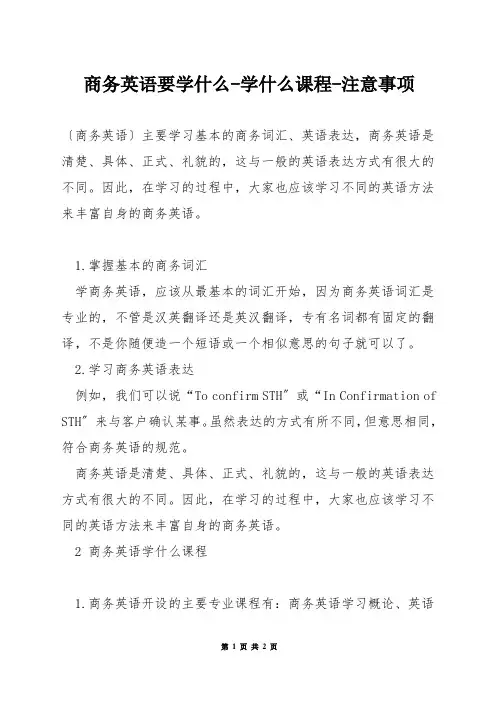
商务英语要学什么-学什么课程-注意事项〔商务英语〕主要学习基本的商务词汇、英语表达,商务英语是清楚、具体、正式、礼貌的,这与一般的英语表达方式有很大的不同。
因此,在学习的过程中,大家也应该学习不同的英语方法来丰富自身的商务英语。
1.掌握基本的商务词汇学商务英语,应该从最基本的词汇开始,因为商务英语词汇是专业的,不管是汉英翻译还是英汉翻译,专有名词都有固定的翻译,不是你随便造一个短语或一个相似意思的句子就可以了。
2.学习商务英语表达例如,我们可以说“To confirm STH〞或“In Confirmation of STH〞来与客户确认某事。
虽然表达的方式有所不同,但意思相同,符合商务英语的规范。
商务英语是清楚、具体、正式、礼貌的,这与一般的英语表达方式有很大的不同。
因此,在学习的过程中,大家也应该学习不同的英语方法来丰富自身的商务英语。
2 商务英语学什么课程1.商务英语开设的主要专业课程有:商务英语学习概论、英语语音、英语语法、英语听力、口语、基础英语、英语写作、商务英语交际、商务英语听力、商务〔英语口语〕、商务英语阅读、跨文化交际、高级商务英语读写、商务概论、经济学、〔管理〕学、金融学、市场营销。
2.商务英语是在熟练掌握英语的基础上,再强调商务。
除了英语听、说、读、写、译、文学、政治、社会文化等方面要求同学掌握并通过国家英语专业四、八级考试外,还涉及商务知识、商务技能、管理、贸易、法律、〔会计〕等商务活动。
3 学习商务英语的注意事项1.复习特定术语,商务英语中有一定的特定术语和商务词汇,在准备商务英语考试的时候,我们应该学习相关的术语和词汇。
在日常工作中,在学习商务英语时,要注意不同行业中不同专业术语的差异,并对相关行业的专业术语进行整理。
2.注意商务场景,学习商务英语有不同的动机和必须求。
商务英语一般用于与老板交谈、开会、交货等场合,所以我们要进行各种商务场景进行商务英语的实战演练。
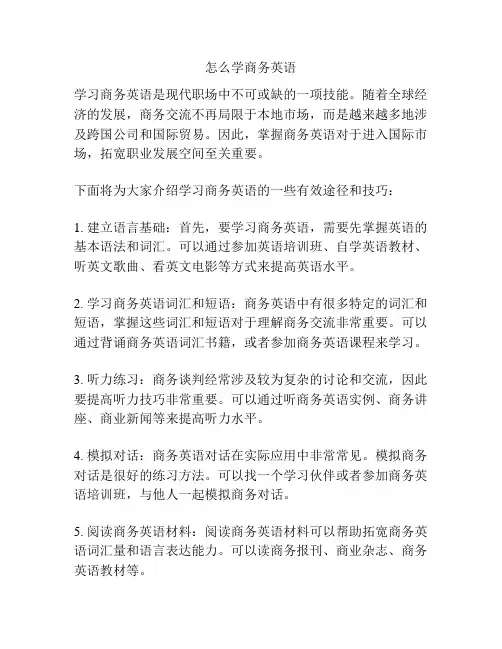
怎么学商务英语学习商务英语是现代职场中不可或缺的一项技能。
随着全球经济的发展,商务交流不再局限于本地市场,而是越来越多地涉及跨国公司和国际贸易。
因此,掌握商务英语对于进入国际市场,拓宽职业发展空间至关重要。
下面将为大家介绍学习商务英语的一些有效途径和技巧:1. 建立语言基础:首先,要学习商务英语,需要先掌握英语的基本语法和词汇。
可以通过参加英语培训班、自学英语教材、听英文歌曲、看英文电影等方式来提高英语水平。
2. 学习商务英语词汇和短语:商务英语中有很多特定的词汇和短语,掌握这些词汇和短语对于理解商务交流非常重要。
可以通过背诵商务英语词汇书籍,或者参加商务英语课程来学习。
3. 听力练习:商务谈判经常涉及较为复杂的讨论和交流,因此要提高听力技巧非常重要。
可以通过听商务英语实例、商务讲座、商业新闻等来提高听力水平。
4. 模拟对话:商务英语对话在实际应用中非常常见。
模拟商务对话是很好的练习方法。
可以找一个学习伙伴或者参加商务英语培训班,与他人一起模拟商务对话。
5. 阅读商务英语材料:阅读商务英语材料可以帮助拓宽商务英语词汇量和语言表达能力。
可以读商务报刊、商业杂志、商务英语教材等。
6. 写作练习:商务英语写作是商务交流的重要组成部分。
可以通过写商务邮件、商务报告、商务提案等来提高写作水平。
7. 练习口语:商务英语口语非常重要,可以通过参加商务英语口语班、与外国人交流、参加商务英语角等方式来提高口语表达能力。
8. 观看商务英语视频教程:现如今,很多教育网站上都有商务英语的视频教程,通过观看这些视频可以加深理解与记忆。
9. 经常与外国人交流:与外国人交流是学习商务英语的最佳方式之一。
可以利用社交平台、语言交换等方式结识外国人朋友,与他们保持联系并进行交流。
总之,学习商务英语需要一定的时间和精力,但只要坚持不懈地进行学习和练习,就能够掌握商务英语的基本技能。
通过学习商务英语,我们可以更好地适应职场环境,提升职业竞争力,为个人职业发展打下坚实的基础。

Business EnglishWarm-up1.How do you study most effectively? By studying…●at the same time every day/ at differenttimes of the day?●early in the morning/ late at night?●on your own/ with others?●at home/ at your place of study (schoolor college)?Studying at the same place and at the same time every day●Associate the place and time with concentration and studying●Create a set study routine●Develop a habit of studyingStudying best early in the morning●Feel energetic and refreshed●Be most efficient mentally (be the sharpest) ●Concentrate the mostStudying best late at night●Most productive and uninterruptedStudying on your own●Free●FlexibleStudying with others●Learning from discussing and sharing thoughts with each other●Helping /facilitating each other●Practicing speakingStudying at home●Comfortable, pleasant and relaxing ●Quiet with less distraction and noisesStudying in the classroom/library ●Forced to study●More focused●QuietWays of workingVocabularyReadingHow to job-share1.1Waysof workingListeningWorking from homeSpeakingA mini-presentationVocabulary❖Different ways of working1.How do you work most effectively?By working…●at the same time every day/ atdifferent times of the day?●early in the morning/ late at night?●on your own/ with others?●at home/ at your place of study (schoolor college)?2.Match these ways of working 1-8 to definitions A-I. Do you work in any of these ways?0 freelance1 teleworking2 job-sharing3 shift-work4 part-time5 temping6 consultancy7 flexitime8 hot-desking A You work during different parts of the day (eg. nights).B You sell your work or services to a number of different companies.C You work for different companies for a short time without a permanent contract.D You work a number of hours per week or month but you decide when you start or finish.E You don’t have a permanent place or office to work at, but you find a place to work when you arrive.F You work for a company from home via email, phone or the Internet.G You only work for some of the week (not full-time).H You do your job for part of the week and another person does it for the other part.I You aren’t employed by a company, but are paid to give specialist advice.VocabularyDifferent ways of working1.freelance2.teleworking3.job-sharing4.shift work5.part-time6.temping7.consultancy8.flexitime / flextime9.hot-desking ❖自由职业❖远程办公/居家办公❖分担工作❖轮班/倒班工作❖兼职❖临时工作❖顾问工作❖弹性工作时间❖办公桌轮用A freelancer, freelance worker, or freelance ➢works independently and on temporary contracts rather than for a long-term employer.Freelance professions:➢photographer, writer, website designer, graphic designer, accountant, dentist, lawyer, translator, etc.Freelancers are self-employed and●can decide what to do, where to provide their services, when to work and how they do their work●risk their own money in their work●can make a loss as well as a profit from their work●provide the main items of equipment they need to do their job●are free to hire other people to do the work they have taken on, or to take on helpers at their own expense●are responsible for correcting unsatisfactory work in their own time and at their own expenseTeleworkingAny way of working at a distance using a combination of computers and telecommunications. It is often associated with home-based working, but includes mobile working, etcWork from Home vs. Work at HomeTelecommuting❖T his term is used interchangeably with teleworking, and is the more common term in the US. The conceptual emphasis is on replacing the commute journey through electronic access to the workplace.word extension :telecommuter/home-based worker 远程办公者Job-sharingTwo workers share a single position and decide together when each will work and which tasks each will perform, and receive salary and benefits on pro- rata basis (in proportion )❖A kind of flexible work arrangementExamples:Two workers split the work of a single position 60%/40%, share the salary accordingly, and are in the office 2 days per week at the same time.Shift Work❖24 hr work schedules❖W ork that is broken into chunks of timee.g. the day shift may be 8 a.m. to 4 p.m.; the night shift midnight to 8 a.m., etc.Related Term: OT (overtime pay加班工资)Permanent Full-Time JobsMost common way of working (50 to 80% of workers) Work directly for the organization with full benefits The “standard” workweek consists of five eight-hour days, totaling 40 hoursPart-Time Jobs❖M ost common alternative way to work❖w ork fewer than 30 or 35 hours per week❖A llows employers to adjust to changes in demand for products, services❖M eets the needs of workers with other personal responsibilitiesTemping❖W orking short employment tasks with a variety of clients, usually through a temping agency.❖T emping is great for building resume, learning skills, networking - and job flexibility and variety.Consultancy❖T he act of an individual or organization providing professional advice to others for a fee. A wide variety of consultants exist for many areas of organizational concerns, including management, accounting, finance, and legal and technical matters.Consultancy 咨询专家,咨询类公司FlextimeWidely practiced in organizations in the following ways:❖W orking 4 days at 10 hours per week❖W orking from 6:30am to 3:30 p.m.❖T aking a half hour for lunch❖W orking longer days and then half days❖W orking weekend daysFlextime(continued)❖H elps employees with other obligations (family, medical, etc.)❖H elps employers who need particular times covered outside the 8-5 shift❖H elps local communities with traffic problemsHot-desking❖a method of sharing desks with workers. This has been made easier by the use of laptops and allows workers to carry out their tasks anywhere when they are working from their own laptop.❖M ore productive use of office space3.Work in pairs. Think of some advantages or disadvantages for each way of working in exercise 2.Possible advantages Possible disadvantages Ways ofworkingfreelanceteleworkingjob-sharingshift-workpart-timetempingconsultancyflexitimehot-deskingWays ofworkingPossible advantages Possible disadvantages freelance you choose the job no job securityteleworking organize your worktime you need to be good at self-organizationjob-sharing more free time need to coordinate withother personshift-work gives you your daysfreetiringpart-time more free time less moneytemping lots of variety hard to progress yourcareerconsultancy well paid no job securityflexitime good for work-lifebalance not good for people who like routinehot-desking saves the companymoneydisruptive to employeesReading4.Read about job-sharing. Write these headings into eachparagraph.Get organized Set your limits Put pen to paper Two become oneOpen your mind Plan for disaster Find the perfect partner Don’t feel guiltyHow to job-shareWouldn’t it be nice if the working week finished on Wednesday? With a job-share it can. Here’s the essential guide to making it work.(0) Find the perfect partner.Find someone you like. ‘Be prepared to communicate and share credit and blame,’ says Carol Savage, the managing director of Flexecutive, a flexible working consultancy. (1) Open your mindBosses should consider requests for flexible working from employees with children under six. So embrace the benefits: ‘ Twice as much experience, skills, brainpower and energy,’ Savage says.(2) Plan for disasterAlways discuss the worst-case scenarios. When Margaret Mills, a teacher, lost her job- share partner because of a family illness, a return to full-time work seemed inevitable.‘We had been over-optimistic. I did manage to find someone else who fitted in with me,Get organized(3)Plan the system for handing work over carefully and play to each other’s different strengths. Delegate the workload according to each other’s particular skills and qualities.(4) Set your limitsManager should clarify what they expect in terms of hours, availability and results, and employees should manage their employer’s expectations. Sue Osborn, a job- sharer for 21 years, says, ‘We’re often asked to do five-day weeks. Eventually you just have to say no.’(5) Put pen to paperAgree in writing arrangements for holidays, parental leave, retirement, etc. everyone should know where they stand from the beginning.(6) Don’t feel guiltyDo not work until 1am at home to make up for not being in the office every day. (7) Two become oneClients may not like having to deal with two people working closely together. As Savage says: ‘A job-share should be like a marriage--- one voice, one unit.’BACKLanguage points❖S hare Credit & Blame: Share Honor & Disgrace❖c onsultancy: consulting company❖r equest (n.) for sth. from sb. /demand for sth from sb. ❖e mbrace: complete accept sth such as a new belief, idea, or way of lifeeg. embrace Buddhism❖the worst-case scenario: the situation that is the worst one you can imagine❖fit in: be accepted by sb because you are similar to him/hereg. She does not fit in with him.❖h and over: give power or control to sb. elseeg. They formally hand power over to the new government next week.❖p lay to one’s strength: concentrate one’s efforts at doing what one is best ateg. The best advice in an interview is to play to your strengths and make no reference to the things you’re not so good at.❖d elegate the workload: divide the workload/job responsibilitiesdelegate: give part of your work/duties/ /responsibilities to sb who is more junioreg. He always delegates boring tasks to his assistant.Parental Leave (育儿假:包括分娩假和领养假)❖P arental leave is an employee benefit that provides paid or unpaid time off work to care for a child or make arrangements for the child’s welfare. Often, the term parental leave includes maternity ( 分娩假), paternity(父亲育婴假), and adoption leave(领养假). Often the minimum benefits are stipulated by law.Parental Leave by CountryPaid MaternalLeavePaid PaternalLeaveUnpaidMaternal LeaveUnpaid PaternalLeaveChina90 days100%Share of 104 weeks (2years) with mother4 weeks non-paid annually(max 13 weeks) given atleast one year's continuousemployment12 weeks France16 weeks (100%)rising to 26 weeks(100%) for third child3 days + 11consecutive daysShare of 104weeks (2 years)with fatherUK39 weeks paid, risingto 52 weeks paidfrom April 20102 weeks at a fixed amount( £123.06)4 weeks per year (non-paidand a max of 13 weeks)4 weeks per year(non-paid and a maxof 13 weeks)USA0 weeks0 weeks12 weeks❖p ut pen to paper: start writing stheg. I have lots of ideas for short stories but find it difficult to put pen to paper.❖k now where you stand: understand your position eg. Once you know where you stand you'll be able to make your next moveQuestionsHow easy would it be for you to job-share?Would your employer or boss think it was a good idea?❖W ork in pairs❖S tudent A is the employee❖S tudent B is the employer❖S tudent A wants to start job-sharing with another colleague, so she/he tries to convince Student B of the advantages of job-sharing❖S tudent B is skeptical and mention disadvantagesUseful expressions❖Y es➢have more free time -- pursue leisure activities and relax ➢have more time with the family➢with less work stress➢have someone to share credit and blame➢a means of keeping valued employees➢result in a more committed and productive work force ➢twice as much experience, skills, brainpower and energyUseful expressions❖N o➢difficult to find someone you like / with similar ability, the right skill and experience➢need to coordinate with the other person( compatibility) ➢need careful planning to play to each other’s different strengths➢difficult to arrangeListening1. Y ou will hear a woman called Michela talking about working from home.1) What does she say is important when working from home?Have a timetable and stick to it.2) What does she think are some of the advantages and disadvantages of this way of working?Advantages:- you spend more time with the children- more flexibility- the company saves money on office space- no commutingDisadvantages:- sometimes you work in the evening- you miss people and office news2 Listen again and answer the following.1) Complete the notes about Michela’s typical day.7:00 – get up, get the kids ready8:30 –9:00 –12:00 –14:30 –take kids to school start workhave lunchfinish work2) How long has she been with her current employer?How long has she been home-working?She’s been with her current employer since she left school, but she’s been home-working for five years.3) Is she doing anything different from normal this week? She’s going to the office every day to meet visitors.Listening scriptI=Interviewer M=MichelaI: OK, Michela. You work from home now. Can you tell me about a typical day?M: Sure, I always get up around seven and the first thing I do is get the kids ready for school. I take them at eight thirty and then I always start work at home.I: Do you ever have a day where you decide to have the morning off and start work later?M: No, you can’t do that. It’s important with home-working to have a timetable and stick to it. If you end up watching TV or doing the cleaning then it isn’t for you. So I have lunch at twelve and finish work at two thirty to get the children.I: Was that why you gave up you office job?M: Yes, I wanted to spend more time with the children. It gives me more flexibility. Sometimes I need to work in the evening but usually it isn’t a problem.I: So how long have you been doing this kind of work?M: For about five years. I’ve been with the same comp any since I left school, but with the Internet and technology it’s easy now to be at home.I: So your employer doesn’t mind.M: No. It means the company saves money on office space and as long as I get the work done, they’re happy. Sometimes I still go into work to meet clients and so on. For example, I’m going in nearly every day this week because we have visitors from another company and I can’t really invite them over to my house. Besides, it’s nice to go in every s o often. I like to see people and catch up on the gossip and the news with my colleagues. I miss that side of going into work every day.I: Is there anything else you miss? M: Ermm. No, not really. And I’ll tell you what I really don’t miss and that’s having to spend two hours commuting on the bus and train every day…SpeakingA mini-presentationA: What is important when …?Job-sharing• Find someone you like.• Organize and plan how you share the work.••B: What is important when…?Working from home• Set up an office space inthe house.• Plan your working hoursand your breaks.••back43Tips❖I choose topic ,I would like to talk about…My topic is…❖I think there are three points/aspects to consider.I have the following points.I think we need to consider 3 aspects.My points are as follows.❖First, / To start withSecond/ Besides/Then/Secondly/In addition❖Third,❖总结:In conclusion,/In summary/so/in short/To conclude ,I think … are important when doing….❖Well, that’s all I want to say. Thank you!Basic Evaluation Standard①Voice② Eye Contact/ Body Language③Content④Structure⑤PacePossible answerA: What is important when …?Job-sharing1.Finding someone you like is the most importantwhen you start a job-share. As job-sharing is a way for two people to both fill one job, finding someone you like is very important for the success of thescheme. You may find one from your currentworkplace, or you may find one from outsidethrough all kinds of contacts.anizing and planning how you share the work isalso important. If it’s shared responsibility, there is no division of duties but the two people have to split the hours clearly to ensure that the work flowscontinuously. If it’s divided responsibility, eachpartner has to be clear about his own case – load or project to focus on during his working hours. If it is unrelated responsibility, the partners have to learnwhat their separate tasks are in the same department, and each has to do his own share well.munication is another important factor toconsider when you arrange the job-share,especially for shared responsibility. Partners have to communicate well so that jobs are donesmoothly. Using email, voicemail messages, daily logs and notes are some techniques that helpfacilitate communication.B: What is important when…?Working from home1.Setting up an office space in the house is importantwhen working from home. This will give you a feel of being in the office and concentrate more on work.In this way, it will be easy for you to differentiatebetween work time and private time you will not be easily distracted.2.It’s also important to plan your working hours andyour breaks. Make it like in the office and set atimetable. But do not overwork yourself to makeup for not being in the office every day. Make sure you have a break after you work for a few hours.。
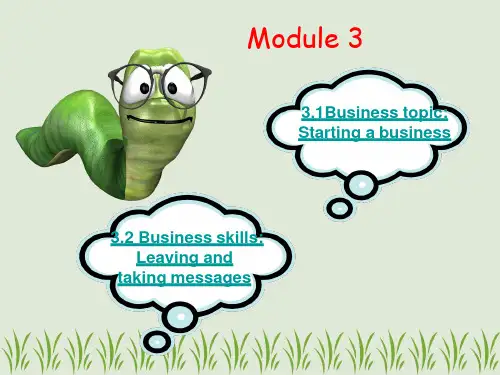
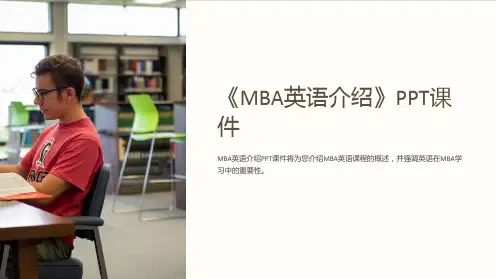
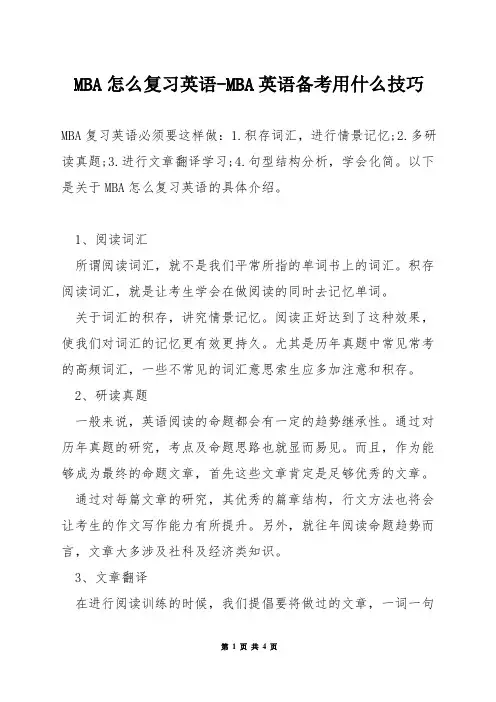
MBA怎么复习英语-MBA英语备考用什么技巧MBA复习英语必须要这样做:1.积存词汇,进行情景记忆;2.多研读真题;3.进行文章翻译学习;4.句型结构分析,学会化简。
以下是关于MBA怎么复习英语的具体介绍。
1、阅读词汇所谓阅读词汇,就不是我们平常所指的单词书上的词汇。
积存阅读词汇,就是让考生学会在做阅读的同时去记忆单词。
关于词汇的积存,讲究情景记忆。
阅读正好达到了这种效果,使我们对词汇的记忆更有效更持久。
尤其是历年真题中常见常考的高频词汇,一些不常见的词汇意思索生应多加注意和积存。
2、研读真题一般来说,英语阅读的命题都会有一定的趋势继承性。
通过对历年真题的研究,考点及命题思路也就显而易见。
而且,作为能够成为最终的命题文章,首先这些文章肯定是足够优秀的文章。
通过对每篇文章的研究,其优秀的篇章结构,行文方法也将会让考生的作文写作能力有所提升。
另外,就往年阅读命题趋势而言,文章大多涉及社科及经济类知识。
3、文章翻译在进行阅读训练的时候,我们提倡要将做过的文章,一词一句的研究透。
不仅要积存词汇、语法,还应该能够做到准确翻译,做到对文章的准确把握。
由于历年英语阅读经济类文章占到了相当大的比例,考生应该对专业词汇的翻译有所积存,保证专业性词汇翻译的准确性。
4、句型结构分析碰到长句就犯怵,摸不到头脑,进而影响到关于整篇文章的理解。
MBA英语阅读中,长句型是很常见的。
其实长句型也是符合简单结构,知识将几个简单句型复合而已。
首先区分整个长句的主谓宾,然后将从句从其中划分出来再一次进行分析,学会化简。
2MBA英语备考用什么技巧1、积存阅读词汇考生在日常复习时要多注意积存阅读词汇,特别对不常见却高频出现的词汇强化记忆。
在阅读过程中尽量不要中途停下来查字典,试着联系上下文对不熟悉的单词的词义进行推测,做完阅读后再回头查字典,对新单词进行理解记忆。
2、注重分析句型结构做阅读理解的时候,常常会碰上句子成分多样,句型结构复杂的题目。
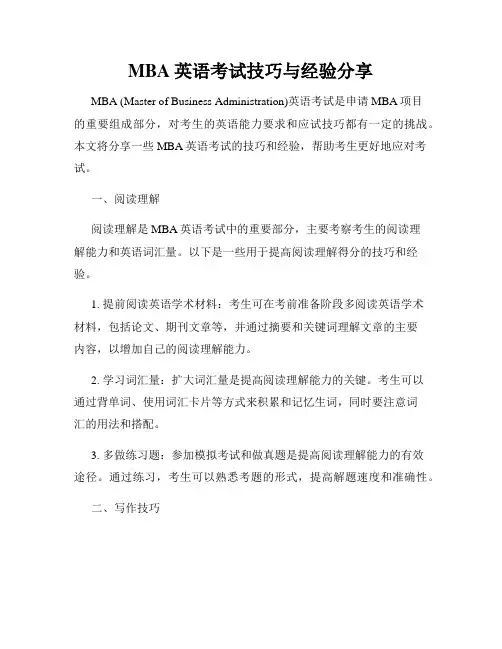
MBA英语考试技巧与经验分享MBA (Master of Business Administration)英语考试是申请MBA项目的重要组成部分,对考生的英语能力要求和应试技巧都有一定的挑战。
本文将分享一些MBA英语考试的技巧和经验,帮助考生更好地应对考试。
一、阅读理解阅读理解是MBA英语考试中的重要部分,主要考察考生的阅读理解能力和英语词汇量。
以下是一些用于提高阅读理解得分的技巧和经验。
1. 提前阅读英语学术材料:考生可在考前准备阶段多阅读英语学术材料,包括论文、期刊文章等,并通过摘要和关键词理解文章的主要内容,以增加自己的阅读理解能力。
2. 学习词汇量:扩大词汇量是提高阅读理解能力的关键。
考生可以通过背单词、使用词汇卡片等方式来积累和记忆生词,同时要注意词汇的用法和搭配。
3. 多做练习题:参加模拟考试和做真题是提高阅读理解能力的有效途径。
通过练习,考生可以熟悉考题的形式,提高解题速度和准确性。
二、写作技巧写作是MBA英语考试中的另一个重要内容,主要考察考生的英语表达能力和逻辑思维能力。
以下是一些建议和技巧,帮助考生提高写作得分。
1. 练习写作范围:通过多写不同主题的作文,考生可以提高写作的灵活性和适应性。
可以选择各类主题,包括经济、管理、社会等,提前准备可能出现的写作题目。
2. 组织文章结构:写作时要注意文章结构的合理性和逻辑性。
开头部分介绍主题,中间部分罗列事实和理由,结尾部分总结观点。
段落之间和句子之间要注意过渡的流畅性。
3. 使用适当的词汇和句式:考生可通过提前准备一些固定搭配、替换词汇和句式,用以增加文章的表达力。
同时要注意使用恰当的语气和措辞,避免语法和拼写错误。
三、口语表达口语表达是MBA英语考试中的一项重要内容,主要考察考生的口语流利程度和思维反应能力。
以下是一些提高口语表达能力的技巧和经验。
1. 多听多说:通过多听英语材料和多参与英语口语练习,考生可以提高自己的听力和口语表达能力。
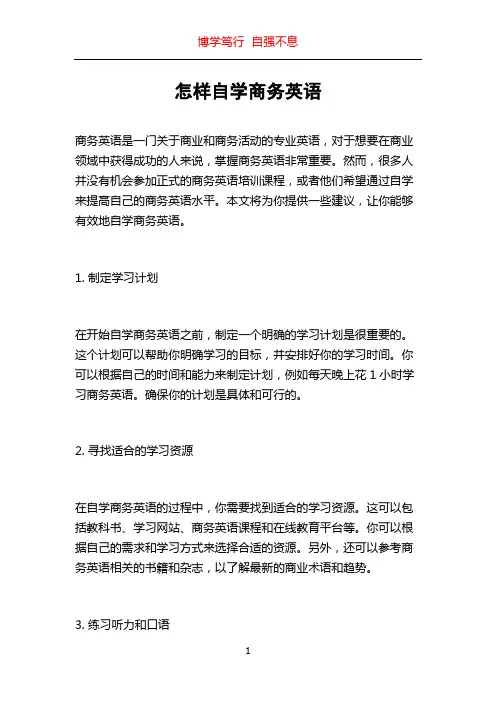
怎样自学商务英语商务英语是一门关于商业和商务活动的专业英语,对于想要在商业领域中获得成功的人来说,掌握商务英语非常重要。
然而,很多人并没有机会参加正式的商务英语培训课程,或者他们希望通过自学来提高自己的商务英语水平。
本文将为你提供一些建议,让你能够有效地自学商务英语。
1. 制定学习计划在开始自学商务英语之前,制定一个明确的学习计划是很重要的。
这个计划可以帮助你明确学习的目标,并安排好你的学习时间。
你可以根据自己的时间和能力来制定计划,例如每天晚上花1小时学习商务英语。
确保你的计划是具体和可行的。
2. 寻找适合的学习资源在自学商务英语的过程中,你需要找到适合的学习资源。
这可以包括教科书、学习网站、商务英语课程和在线教育平台等。
你可以根据自己的需求和学习方式来选择合适的资源。
另外,还可以参考商务英语相关的书籍和杂志,以了解最新的商业术语和趋势。
3. 练习听力和口语商务英语中的听力和口语技巧是非常重要的。
你可以通过听商务英语教材、英语电台或商业新闻来提高自己的听力技能。
同时,多与他人进行英语对话,练习你的口语表达能力。
如果有条件,可以参加英语角或者找一个语言交换伙伴,这样可以提供更多的口语练习机会。
4. 阅读商务英语材料阅读商务英语材料可以帮助你扩展商务词汇和理解商业文化。
你可以阅读商业报纸、商业杂志和商业书籍,掌握商务英语表达方式和用词习惯。
同时,也可以关注一些商务英语博客和网站,了解最新的商业信息和趋势。
5. 写作练习商务英语中的书面表达能力同样重要。
你可以尝试写商务邮件、商业报告和商务计划等,以提高自己的书面表达能力。
在练习中,注重语法、词汇和写作风格的正确与流畅。
6. 创造语言环境创造一个英语学习的环境对于自学商务英语也是很重要的。
你可以通过观看英语电影和电视剧、收听英语新闻和音乐、参加英语俱乐部等方式来增加接触英语的机会。
此外,你还可以利用社交媒体和商务社交平台来和英语母语者互动,提高交流能力。
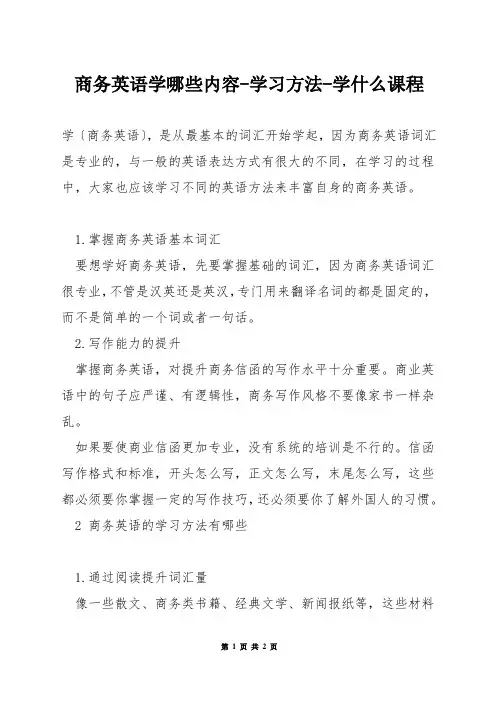
商务英语学哪些内容-学习方法-学什么课程学〔商务英语〕,是从最基本的词汇开始学起,因为商务英语词汇是专业的,与一般的英语表达方式有很大的不同,在学习的过程中,大家也应该学习不同的英语方法来丰富自身的商务英语。
1.掌握商务英语基本词汇要想学好商务英语,先要掌握基础的词汇,因为商务英语词汇很专业,不管是汉英还是英汉,专门用来翻译名词的都是固定的,而不是简单的一个词或者一句话。
2.写作能力的提升掌握商务英语,对提升商务信函的写作水平十分重要。
商业英语中的句子应严谨、有逻辑性,商务写作风格不要像家书一样杂乱。
如果要使商业信函更加专业,没有系统的培训是不行的。
信函写作格式和标准,开头怎么写,正文怎么写,末尾怎么写,这些都必须要你掌握一定的写作技巧,还必须要你了解外国人的习惯。
2 商务英语的学习方法有哪些1.通过阅读提升词汇量像一些散文、商务类书籍、经典文学、新闻报纸等,这些材料往往涵盖丰富的内容资源,涵盖各个方面,可以为你提供源源不断的新单词,一方面提升自己的词汇量,另一方面强化自己对单词的记忆。
2.注意新词汇的使用在学习商务〔英语口语〕的过程中,总会有一些新单词或生词出现。
有时你会发现忘记它们有点困难,反而很快就记住了。
因此,在学习的过程中,要做好记录,不断积存。
3.与母语为英语的人交流我们要知道商务口语不是一般的日常英语,它的内容大多是商务。
因此,在寻找英语为母语的人的时候,应该尽可能多的去寻找商务人士,模仿他们,尽可能多的与他们交流,学习英语使用者的商务英语思维模式,突破自己的心理障碍。
3 商务英语学什么课程1.基础英语课程,包括大学基础英语听、说、读、写、译、英美文化、语言文学知识等课程。
2.商务英语核心课程,包括商务英语听说、商务英语阅读、商务英语写作、商务英语翻译、国际文化交流等课程。
3.商务英语专业课程,依据商务英语的发展特点开设:国际贸易、国际金融、国际商法、国际旅游、国际新闻、国际投资与合作、国际市场营销等课程。
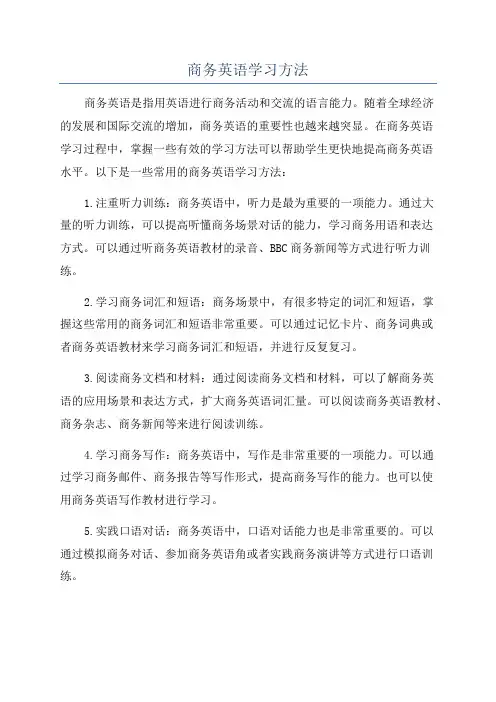
商务英语学习方法商务英语是指用英语进行商务活动和交流的语言能力。
随着全球经济的发展和国际交流的增加,商务英语的重要性也越来越突显。
在商务英语学习过程中,掌握一些有效的学习方法可以帮助学生更快地提高商务英语水平。
以下是一些常用的商务英语学习方法:1.注重听力训练:商务英语中,听力是最为重要的一项能力。
通过大量的听力训练,可以提高听懂商务场景对话的能力,学习商务用语和表达方式。
可以通过听商务英语教材的录音、BBC商务新闻等方式进行听力训练。
2.学习商务词汇和短语:商务场景中,有很多特定的词汇和短语,掌握这些常用的商务词汇和短语非常重要。
可以通过记忆卡片、商务词典或者商务英语教材来学习商务词汇和短语,并进行反复复习。
3.阅读商务文档和材料:通过阅读商务文档和材料,可以了解商务英语的应用场景和表达方式,扩大商务英语词汇量。
可以阅读商务英语教材、商务杂志、商务新闻等来进行阅读训练。
4.学习商务写作:商务英语中,写作是非常重要的一项能力。
可以通过学习商务邮件、商务报告等写作形式,提高商务写作的能力。
也可以使用商务英语写作教材进行学习。
5.实践口语对话:商务英语中,口语对话能力也是非常重要的。
可以通过模拟商务对话、参加商务英语角或者实践商务演讲等方式进行口语训练。
6.参加商务英语培训班:参加商务英语培训班可以系统地学习商务英语的基础知识和技能,并进行集中强化和实践训练。
可以选择线上或线下的培训班,根据自己的需求选择合适的培训内容和形式。
7.多找商务英语学习伙伴:和其他学习商务英语的同学或者朋友一起学习,可以相互帮助、交流和练习。
可以一起讨论商务英语问题,进行角色扮演和对话练习。
8.刻意练习:学习商务英语需要不断地进行练习和实践。
可以通过模拟商务场景进行对话练习、商务写作练习、听力训练等方式进行刻意练习,提高商务英语能力。
9.关注商务英语资讯:关注商务英语相关的新闻、企业文化、商务趋势等信息,可以了解商务英语的实际应用和最新动态,提高对商务英语的理解和运用能力。
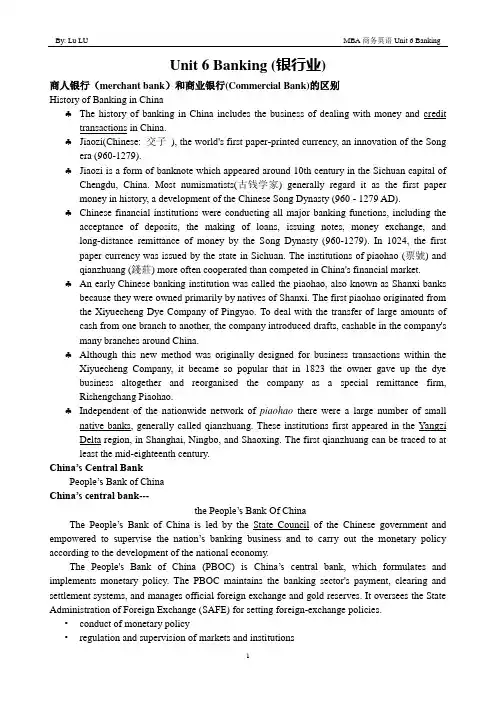
Unit 6 Banking (银行业)商人银行(merchant bank)和商业银行(Commercial Bank)的区别History of Banking in China♣The history of banking in China includes the business of dealing with money and credit transactions in China.♣Jiaozi(Chinese: 交子), the world's first paper-printed currency, an innovation of the Song era (960-1279).♣Jiaozi is a form of banknote which appeared around 10th century in the Sichuan capital of Chengdu, China. Most numismatists(古钱学家) generally regard it as the first paper money in history, a development of the Chinese Song Dynasty (960 - 1279 AD).♣Chinese financial institutions were conducting all major banking functions, including the acceptance of deposits, the making of loans, issuing notes, money exchange, and long-distance remittance of money by the Song Dynasty (960-1279). In 1024, the first paper currency was issued by the state in Sichuan. The institutions of piaohao (票號) and qianzhuang (錢莊) more often cooperated than competed in China's financial market.♣An early Chinese banking institution was called the piaohao, also known as Shanxi banks because they were owned primarily by natives of Shanxi. The first piaohao originated from the Xiyuecheng Dye Company of Pingyao. To deal with the transfer of large amounts of cash from one branch to another, the company introduced drafts, cashable in the company's many branches around China.♣Although this new method was originally designed for business transactions within the Xiyuecheng Company, it became so popular that in 1823 the owner gave up the dye business altogether and reorganised the company as a special remittance firm, Rishengchang Piaohao.♣Independent of the nationwide network of piaohao there were a large number of small native banks, generally called qianzhuang. These institutions first appeared in the Y angzi Delta region, in Shanghai, Ningbo, and Shaoxing. The first qianzhuang can be traced to at least the mid-eighteenth century.China’s Central BankPeople’s Bank of ChinaChina’s central bank---the People’s Bank Of ChinaThe People’s Bank of China is led by the State Council of the Chinese government and empowered to supervise the nation’s banking business and to carry out the monetary policy according to the development of the national economy.The People's Bank of China (PBOC) is China’s central bank, which formula tes and implements monetary policy. The PBOC maintains the banking sector's payment, clearing and settlement systems, and manages official foreign exchange and gold reserves. It oversees the State Administration of Foreign Exchange (SAFE) for setting foreign-exchange policies.•conduct of monetary policy•regulation and supervision of markets and institutions•provision of payment and settlement services•issue currency and regulate its circulation•manage the official international reserves•act as fiscal agent•participate in international financial cooperation on behalf of the stateChina Banking Regulatory Commission (CBRC)was officially launched on April 28, 2003, to take over the supervisory role of the PBOC. The goal of the landmark reform is to improve the efficiency of bank supervision and to help the PBOC to further focus on the macro economy and currency policy.♣China’s Policy banks 政策性银行–China Development Bank (CDB)–Agricultural Development Bank of China (ADBC)–Export - Import Bank of China (Chexim)China’s Policy banks (non-commercial bank) were established in 1994 to take over the government-directed spending functions of the four state-owned commercial banks. These banks are responsible for financing economic and trade development and state-invested projects.CDB specializes in infrastructure financing, the ADBC provides funds for agricultural development projects in rural areas; and Chexim specializes in trade financing.The "big four" State-owned Commercial Banks---Bank of China (BOC)---Agricultural Bank of China (ABC)---Construction Bank of China (CCB)---Industrial & Commercial Bank of China (ICBC)♣The Bank of China (BOC) specializes in foreign-exchange transactions and trade finance.In 2002, BOC Hong Kong (Holdings) was successfully listed on the Hong Kong Stock Exchange. The USD 2.8 billion offering was over-subscribed by 7.5 times. The deal was a significant move in the reform of China’s banking industry.♣The Agriculture Bank of China (ABC) specializes in providing financing to China's agricultural sector and offers wholesale and retail banking services to farmers, township and village enterprises (TVEs) and other rural institutions.♣The China Construction Bank (CCB) specializes in medium to long-term credit for long term specialized projects, such as infrastructure projects and urban housing development.♣The Industrial & Commercial Bank of China (ICBC) is the largest bank in China by total assets, total employees and total customers. ICBC differentiates itself from the other State Owned Commercial Banks by being second in foreign exchange business and 1st in RMB clearing business. It used to be the major supplier of funds to China's urban areas and manufacturing sector.12 Joint Stock Commercial Banks♣Bank of Communications♣China CITIC Bank♣Hua Xia Bank♣China Merchants Bank♣Everbright Bank of China♣China Minsheng Banking♣Shanghai Pudong Development Bank (SPD BANK)♣Shenzhen Development Bank♣China Bohai Bank♣Guangdong Development Bank♣Industrial Bank♣China Zheshang BankJoint-venture Banks 合资银行--- Ningbo International Bank---Xiamen International BankOther banks:---City Commercial Banks---Foreign Banks’ BranchesForeign Banks’ BranchesCiti BankHSBCABNBank of Tokyo-MitsubishiDBS BankBangkok BankCSFBStandard Chartered BankBank of East AsiaHang Seng BankMizuho Corporate BankWing Hang BankDepositRMB depositForeign currency depositDeposit by correspondenceMultifunctional debit cardIssuance of foreign currency taking certificateDeposit collections in different placesDeposit certificate loss reportingPersonal FinancingHousing loansAuto loansEducational loansLoans for refurbishing housesTravel and vacation loansConsumer durable loansAdvanced Financing ToolAutomatic banking of saving depositsPassbook of savings accountsPassbook of time depositsMultifunctional debit cardPersonal checkSafe deposit boxFee-based businessPersonal Foreign Exchange BusinessCurrency conversion(兑换)Exchange purchase(购汇) for personal affairsIssuance of foreign currency taking certificateInternational remittance-outwardInternational remittance-inwardGlobal remittance in one dayE-Banking 电子银行I-bankingTelephone banking serviceMobil-phone banking serviceBanks in the United KingdomThe Central Bank: the Bank of EnglandBig Four•HSBC•Barclays Bank•Lloyds Bank•National Westminster BankThe Bank of EnglandFounded in 1694, the Bank of England is the Central Bank of UK. It was a joint stock (合股) company when it was originally formed for the sole purpose of financing the war agains t France. By virtue of (由于) the Bank Charter (银行特许条例) Act 1844, which gave it the sole power to issue bank notes, the Bank of England was split into two parts; the Banking Department (营业部) and the Issuing Department (发行部).The Banking Department handles the bankingOperations which may influence government policy, the operations of the commercial banks and the money market. The Issuing Department is responsible for the issuance of bank notes. The Bank of England Act 1946 allowed the State’s Acquisition (兼并) of the Bank --- a transformation of the Bank from private to public ownership.Functions of the Bank of England•It is responsible for the issue of bank notes in England and Wales, raising finance for the government, implementing monetary policies of the government.•raise finance•implement monetary policies•daily settlements(每日结算)of clearing•discount house (贴现银行、贴现公司)International RoleParticipates in the international activities of organizations such as the International Monetary Fund (国际货币基金组织,IMF), the International Bank for Reconstruction and Development or the World Bank (国际复兴开发银行/世界银行).Three Bank in Scotland Issued NotesBANK OF SCOTLAND 苏格兰银行Clydesdale Bank PLCRoyal Bank of Scotland PLCHSBCHSBC Basic Bank Account(银行基础帐户)is easy to understand and simple to manage. It is ideal for customers who are 18 and over, who require only a few basic transactions per month.Key features and benefits•Check balances, get statements and make withdrawals of up to £200 per day with your Basic Bank Account card at HSBC Bank cash machines in the UK.•Access up to £200 per day through the counter at Post Office branches with your Basic Bank Account card and PIN.•Pay regular bills and set up standing orders and Direct Debits (直接借记)on your account.•Enjoy free Internet and Telephone Banking, as well as services at your local branch.Debit cardsGetting the best out of your debit card in the UK and abroad•Pay for goods and services at home or abroad wherever you see the Maestro sign.•Withdraw cash in the UK at any HSBC Bank cash machine.•Withdraw cash at over 600,000 Cirrus/Maestro cash machines worldwide.•Chip and PIN gives extra security when making purchases.Debit cardsSolo key features•Pay for goods and services wherever you see the Solo sign.•Withdraw cash in the UK at any HSBC Bank cash machine.•Y ou can only spend up to the balance on your account.Student ServiceWhat you get•£1000 interest free overdraft in your first year.•Debit and credit cards, of course.•Price Promise Insurance•24/7 Internet and Telephone Banking•Free BSM driving lesson.•Specialist university branches with helpers who appreciate your needs.Special insurance rates•Student Insurance – to cover your stuff from as little as £24 per year.•Y outh Travel Insurance – travel safely whether it's Scotland or Sydney.Plus great discountsY ou'll also get a discount card with great offers and discounts on music, film, fashion and much, much more as soon as your account is opened.International studentsKey features and benefits•24h/7D Internet and Telephone Banking•Solo, debit card•Cheque book•Direct Debits and Standing Orders (议事程序)• A range of Savings Accounts•Insurance Services - Travel and Possessions•Free BSM driving lesson- no strings(无附带条件) attached•20% off Lonely Planet guidebooksReading1. institution (organization)2. look after=take care=be in charge of =be responsible for3.monetary 金钱的,货币的~ policy/system/unit4. act as 担当/充当/起….作用Maybe I can act as a messenger for you.I must find someone to act as a deputy for meduring my absence.5.branch~ of a rivera branch linea ~ post office6.offerThe job offers prospects of promotion.I will offer you 10 pounds for this book.7.accountI have 100 pounds in my account.Will you pay cash or shall I charge it to youraccount?8.shuttleThere is a shuttle service between the city center and air station.I’m flying to Boston on the shuttle.shuttle space9.en-route(enroute) on the wayThey passed through Paris en-route for Rome.We stopped at Paris en-route from Rome to London.10.up-to-the-minute=latest11.overallOverall, it is a interesting book.How much will it cost overall?~ improvement12.financial positionnet position13.fit inDo these plans fit in with your arrangements?They fit in there.14.access 存取文件initiate 开展transfer 转帐locate=find15.instantlyThe poor girl was dismissed instantly.It is an instantly recognizable face.16.exclusive~ exclusive rights for sale~ agency~ use17. devoteHe devoted himself entirely to music.Please devote more time to your work.He started to study ecology and decided to devotehis whole life to the science.18.routineThey did it as a matter of routine.~ inspection19.restrictY ou are restricted to eight liters of duty-free wine.I restrict myself to smoking two cigarettes a day.20.minimum-- minimizemaximum-- maximize21.designate指定The chairman has designated Mary as his successor.The city has been designated a development area.22.specify(specifically define,define sth. in details)Please specify when you will be at home tomorrow.The regulations specify that you may use a dictionary in the examination.23.process~ data24.facility 装置/设备。
商务英语零基础怎么学(1)天天保持读15分钟英语,培养语感别认为这个看起来很简单,莫轻视它,它看似简单,实则保持却难,不管过年,考试,什么的天天都雷打不动的保持,一段时间后,你将进步神速。
读也有要求,不能模糊乱七八糟的读,要认真仔细的对待它,且大声朗诵,建议请人监督你天天读。
(2)天天有空没空都放着英语磁带在那儿听不必须要你专门坐在那儿,在吃早餐,做家务,刷牙洗脸,甚至睡觉前听着它直至睡着,这也可以,听着听着,你将会有英语语感,且更加熟悉句式,语法等。
(3)最重要的一点,上课仔细听老师讲这个真的真的很重要,学会做笔记,老师讲的一些你认为重要的知识也要摘抄。
错题及时清,学会归纳,分析总结。
认真对待做作业,课前预习,课后复习。
建议你专门买一本学习来做,天天保持做一点,到时候你将成为神人。
望保持,保持与否,看你恒心,可恒心会改变你的一生,望珍惜。
快速记单词,通过联想且你要学会读它会音标拼写应该很快就能够记住单词了吧。
2商务英语零基础如何学1.学习商务英语必须要有准备在开始正式学习之前,你要做好以下准备工作:第一,对课程的了解和自我英语水平的分析。
关于商务英语你了解多少?自己的英文到底是什么水平?为什么你认为你必须要学习商务英语?只有这些问题都分析清楚了,之后制定的学习计划才是有的放矢的。
商务英语就是在工作环境中应用的英语。
它的根本还是学习英语,只是在词汇和语言表达上更集中在各种商务环境所应用的部分。
所以学习商务英语并不是很多人理解的就是上用英文授课的MBA,它不是以传授商务技巧为主的课程。
它在学习方法上与学习一般英语也是没有根本区别的。
熟悉到这一点是非常重要的。
就好比你在餐厅点菜的时候点了一个从来没点过的菜,你以为应该是甜的,可是上来后才发现是咸的,虽然菜很好吃,却不是你爱吃的,这样你不但有了经济上的损失,原本想要的东西也没得到,最后损失的还是自己。
2.对商务英语有了正确的熟悉在对商务英语有了正确的熟悉同时,也要对自己状况的做一个分析。
商务英语怎样自学1、制定学习计划非常有必要商务英语学习比日常英语有难度,想要学好绝对要下一番功夫才行,商务英语外教认为制定学习计划是第一步。
成年人的时间紧张,学习不能按照心情来,心情好的时候就多学一会,不好的时候就不想学。
2、学习内容和学习方式要因人而异商务英语外教常常碰到这样的状况,有些学员一上来就要求自己要学哪本书或者采纳某个学习方案,殊不知并不合适自己。
只有合适自己的才是最好的,合适别人的并不一定合适你。
3、天天保持读英语文章如果你喜爱读英语美文那就读美文,喜爱读新闻类的那就读新闻类的,喜爱新概念的文章那就读新概念,在读的过程中才干知道哪些单词自己还不会读,在读的过程中也要注意。
2商务英语的自学技巧一.要集中精力学习英商务英语常常说,'贵人多忘事",平常工作越忙,处理事物越杂,〔记忆力〕越不好。
研究说明,不同类别的信息记忆会彼此干扰,造成遗忘。
不要今天学一个生活口语主题,明天学一个商务英语主题。
选择一本好的商务英语教材即可,内容不要太滥。
如果为了考试,学习BEC商务英语。
二. 再忙也要合理安排时间,不要填鸭式集中学习有研究指出,多次小段时间学习一份资料,能给予大脑充分的时间处理信息。
能将一份内容多次小段时间学习的同学,其学习效率远远高于喜爱马拉松式学习的同学。
当然,这个小段时间不能太短,如10分钟,15分钟,时间太短很难马上集中精力。
三.总结商务英语学习大纲很多同学学习就是跟着上课、跟着教材一页页学,没有习惯每半个月或一个月将知识结构梳理一遍。
我比较提倡模块化商务英语学习,按实际运用必须求,一般分几个阶段:1. 面试英语:找工作必须要。
2. 办公室生存英语:进入外企日常工作口语交流,如汇报工作,同事闲聊。
合适初入职场或刚起步的同学。
3商务英语的自学方法BEC2要求考生的英语水平最好能在6级左右当时的我刚好飘过四级,就冒失地报了名。
而且还要面临着BEC 改版后的第一次考试,据说新试卷难度有所加大,更加注重对考生能力的测试。
为什么要读mba英文1、可以培养自己成为工商〔管理〕领域里的通才。
MBA集管理、营销、金融、〔财务〕、人力资源、管理〔沟通〕诸多领域之大成,是锻炼自己成为工商管理通才的最有效的方法之一。
2、强化自己的核心才能。
通过MBA的学习,发现自己的专长与擅长,必修和选修一批能培养自己核心才干的课程,打下自己工商管理主攻方向坚实的基础。
3、学到团队合作的精神。
MBA的学习中很多方面都必须要小组成员之间的配合,必须要集体作战,都必须要团结协同和共同发展。
这种Teamwork的精神是许多著名商学院都大力推崇的学习风格。
4、培养管理沟通的能力。
管理沟通是MBA很关键的一个技能,不仅要学会作报告,作讲演,介绍和分析案例,还要掌握现代资讯手段,尤其是熟练使用〔电脑〕以及互联网等,充分把它们运用到管理沟通之中。
5、读MBA还有一个其他专业不能比拟的,就是不仅在学院中有良师益友,随时能向出色的教授和有丰富商场施行经验的兼职教授请教学习,更重要的是还常常有机会倾听来自第一线的中外CEO 或企业家的现身说法,直接分享他们的成功心得和得到的教训。
6、当然,最后,也是读MBA很重要的一环,就是获得MBA的资格承认。
这是一种凭证,一种受过系统工商管理训练的证实,有了它,就有了一个开启职业生涯大门的钥匙,这是走向高薪、高回报的新起点,是一种焕然一新、迥然不同的商旅生涯的开始。
2MBA英语该怎么复习词汇,是英语学习的基础,很多同学之所以英语差,就是因为首先词汇关就没有过,而且在背单词上很多同学可能有误解:认为只有较笨的同学才会在单词的死记硬背上下功夫,而〔考研〕英语必须要的是对长句难句的理解和一些高超的解题技巧。
理由是有的参照书上印有这么一句话:单词不是考研英语的关键,长句理解才是考研英语的关键。
然而现在我再来看这句话,我觉得应该理解为:就算你单词全都熟悉了,句子,文章你也不一定能读懂,更何况如果还有生词呢?所以,单词并不是不重要,而是更重要了,而且我认为最好能把大纲词汇一个不落地背下来,第一来单词背得多不会有坏处,二来这也能极大地强化自己的自信心。